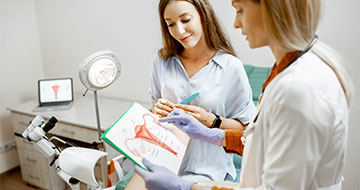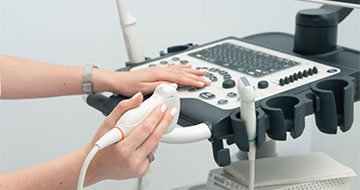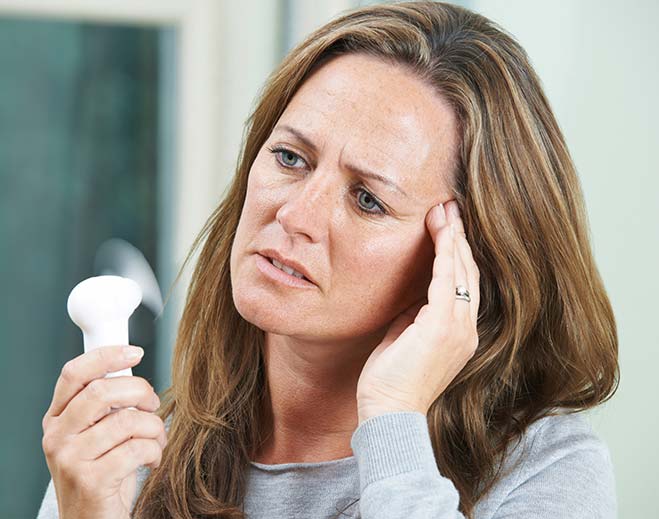Providing Advanced Health Care for Women
At Baptist Health System, we are determined to help women stay proactive with their health by providing a wide variety of high-quality gynecology services. We have board-certified gynecologists in San Antonio who diagnose, treat and manage different types of conditions related to the female reproductive system, such as ovarian cysts, uterine fibroids, tumors and more. In addition to our gynecologists, our team consists of nurses, technologists and administrative staff who will work with you to accompany you throughout your journey.
Whether you’re experiencing signs of a certain disease, are planning to schedule a gynecology exam or you simply need a second opinion about your condition, our gynecologists in San Antonio are equipped and ready to provide expert and compassionate care. Also, our nurses, radiologists and administrative staff are here to assist and support you, from day the you come to us for help until we see you at your best self again. At Baptist Health, the following are some of the gynecological care we offer:
- Gynecology tests and screenings in various imaging centers
- Personalized care programs focused on your unique needs
- Surgeons in a wide range of open and laparoscopic gynecological surgeries
- Robotic-assisted surgeries that may lead to less scarring, shorter hospital stays and faster recovery period
What Is Gynecology?
Gynecology is a branch of medicine that deals with specific health concerns of women, such as the diagnosis, prevention, therapy and treatment of diseases and disorders concerning the female reproductive system. These include menstruation concerns, fertility issues, hormone disorders, STIs, ovarian cysts, female organ-related cancers and more.
What Exactly Does a Gynecologist Do?
A gynecologist is a doctor who specializes in the female reproductive system. They are knowledgeable in a wide range of health concerns, including menstruation issues, fertility problems, sexually transmitted infections (STIs), hormone disorders, pregnancy and childbirth. Baptist Health System gynecologists also carry out routine health screenings and examinations, family planning sessions, immunizations, preventive medicine and general health care for women, whether or not they’re related to the reproductive system.
Gynecologists have finished at least eight years of education and training – four years in general medicine and four years specializing in the field of obstetrics and gynecology. In addition, they must be certified and registered by a professional organization such as the ABOG and the American College of Obstetricians and Gynecologists (ACOG).
What Are Different Gynecology Subspecialties?
The American Board of Obstetrics and Gynecology (ABOG) recognizes several gynecology subspecialties. These include the following:
- Gynecology oncologist – manages and treats cancers of the female reproductive system through palliative care, surgery and chemotherapy.
- Menopausal and geriatric gynecologist – provides care and treatment options to women who are in the menopausal and geriatric age groups.
- Pediatric and adolescent gynecologist – provides care and treatment options to adolescents who have common or complex reproductive organ health issues.
- Minimally invasive gynecologic surgery – conducts endoscopic, gynecological surgeries including operative hysteroscopy, operative laparoscopy and robotic surgery.
- Female pelvic medicine and reconstructive surgeeon – treats disorders of the genitourinary system through surgery, urodynamics and cystoscopy.
- Reproductive endocrinology and infertility – treats infertility and hormonal issues using certain techniques such as vitro fertilization and laparoscopic surgery.
- Hospice and palliative medicine – helps prevent and relieve the suffering of women with life-limiting illnesses in an interdisciplinary setting.
- Complex family planning – focuses on contraception and abortion.
- Critical care medicine – diagnoses, treats and manages critical illnesses and injuries.
When Is the Best Time to See a Gynecologist in San Antonio?
You may see a gynecologist in San Antonio at any age, although the ACOG recommends visiting a gynecologist as early as 13 to 15 years old. Women, in general, are advised to see a gynecologist for annual check-ups and anytime they have health concerns or are experiencing symptoms of a health condition. If you are experiencing an emergency, please call 9-1-1 or visit the closest emergency room.
Gynecology Conditions We Treat
Baptist Health System provides advanced treatment options for various gynecology conditions, such as (but are not limited to) the following:
- Adnexal tumors
- Bartholin’s cysts
- Cervical dysplasia
- Cervical and uterine cancer
- Endometriosis
- Incompetent cervix
- Menorrhagia or excessive bleeding
- Ovarian cysts
- Ovarian tumors
- Pelvic inflammatory diseases
- Sexual dysfunction
- Sexually transmitted infections
- Uterine fibroids
- Uterine prolapse
What Are the Symptoms of a Gynecological Condition?
Some common symptoms of gynecological conditions are as follows:
- Abnormal vaginal discharge
- Back and/or abdominal pain
- Bloating
- Changes in vulva skin or color (i.e., sores, rash, warts, etc.)
- Frequent or urgent need to urinate
- Itching, burning or tenderness of the vulva
- Pelvic, vaginal and/or vulvar pain
- Unusual vaginal bleeding
Please see a gynecologist if you experience any of the signs and symptoms of a gynecological condition. If you are experiencing an emergency, please visit the nearest emergency room or call 9-1-1.
How Do Doctors Diagnose a Gynecological Condition?
To properly diagnose gynecological conditions, our gynecologists at Baptist Health System may conduct medical consultations, physical exams and may also request specific gynecological exams such as the following:
- Cervical biopsy – taking a sample from the cervix to test for abnormal or precancerous conditions
- Colposcopy – a microscopic exam that gives OB/GYNs an enlarged view of the cervix and helps them find problems that may not be identified by the eyes alone.
- Cystoscopy – a test that checks the health of the bladder and urethra
- Endometrial biopsy – taking a sample from the uterus lining to test for abnormal or precancerous conditions as well as endometriosis.
- Hysteroscopy – checking the uterus using an endoscope
- Mammography – an x-ray image of the breast
- Pap smear test – a screening that checks the presence of precancerous or cancerous cells in the cervix
- Pelvic laparoscopy – a surgery that examines pelvic organs
- Ultrasound scans – use sound waves to take images of and evaluate internal organs
Gynecology Treatment Options
Should you be diagnosed and need further treatment, Baptist Health System offers advanced technology customized treatment options. These include (but are not limited to) the following:
- Cryosurgery
- Dilation and curettage
- Hysterectomy
- LEEP procedure
- Myomectomy
- Robotic surgery
Our gynecologists also offer treatment plans that may involve taking over-the-counter (OTC) and prescription medications, certain therapies and lifestyle changes (i.e., eating healthy, increasing physical activity, avoiding smoking, managing stress, etc.)
How to Prepare for Your Gynecology Consultation or Exam
What you can expect on your gynecology consultation may vary depending on the reason for your visit. No matter what the reason for your visit is, it will be helpful to remember or prepare the following before your appointment:
- Please arrive at least 15 minutes prior to your schedule so you’ll have enough time to fill out forms or documents (if any).
- Please bring a photo ID, your health insurance card/s and any other relevant medical records.
- Be open with your doctor about your symptoms or condition. Providing an honest account about your health concern can help your doctor provide the best possible care or treatment plan.
- Please follow your doctor's instructions if you need to go through a gynecological exam, such as a pap smear or an ultrasound. Don’t hesitate to ask your gynecologist any questions that you may have.
- If you have a period on the day of your appointment, you can still proceed as planned, but it you may need to reschedule, unless you have signs or symptoms that need immediate attention.
- It is best to avoid sexual activity, using tampons or using a vaginal douche for at least two days before a gynecological exam.
Schedule an Appointment
To schedule an appointment with one of our gynecologists in San Antonio or to book a gynecology exam, please call 866-309-2873. To see our list of classes or events, click here.













